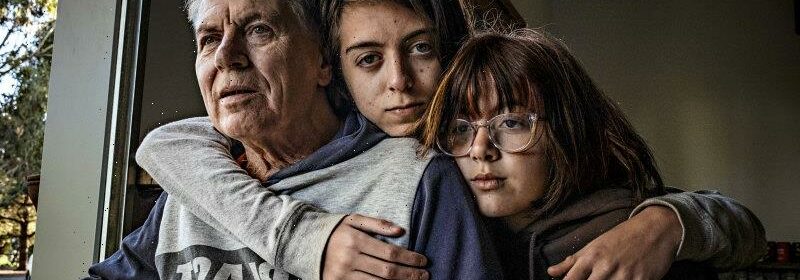‘I grew up quickly’: $3 million in grants for young carers

Key points
- Neal Furze was diagnosed with sepsis five years ago. His legs and his fingers were amputated to save his life.
- Sam and Eloise, then aged just eight and 11, became his carers, along with their mother.
- The federal government is providing $3 million worth of $3000 grants to go towards young carers’ education.
Sam’s father used to kick the football with him in the backyard and ferry him and his younger sister, Eloise, to their swimming lessons.
They went on camping trips together and spent afternoons playing at the park.
Sam and Eloise Furze, aged 16 and 13, became carers to their father, Neal, after he developed sepsis in 2017.Credit:Chris Hopkins
But five years ago, their lives dramatically changed. Their father, Neal Furze, fell ill on grand final day, while watching Richmond beat Adelaide, with what was later diagnosed as sepsis. His legs and all of his fingers were amputated. It saved his life.
Sam and Eloise, then aged just eight and 11, became his carers, along with their mother, Kristine Rawlinson, at their family home in Riddells Creek, near the Macedon Ranges in Victoria.
“It’s been hard, [watching] someone so close to you change so rapidly,” says Sam, now 16. “It’s a lot. I grew up pretty quickly.”
Carers Australia estimates 250,000 people around the country aged between 12 and 25 are unpaid carers. To help ease the burden, the federal government is providing $3 million worth of $3000 grants to go towards their education. Applications for the Young Carer Bursary can be made until September 13.
Over the years, the siblings have helped Kristine with tasks for their father from opening milk bottles to helping him get in and out of his wheelchair and putting his prosthetic legs on.
More recently, their role has included encouraging him to do more things for himself so that he can master new skills.
“It’s really funny because our dynamics are all over the place,” says Kristine. “Sometimes it’s hard to know who the parents are.”
Neal, who also has lymphoma, a cancer of the lymphatic system unrelated to his disability, says those dynamics have sometimes been difficult for him.
“Having my children help me, it’s humbling because I’ve never expected to be in this position,” he says. “It means a lot to me.”
Neal says he’s been left humbled by his children’s care. Credit:Chris Hopkins
Eloise, now aged 13, says she has struggled under the weight of responsibility at such a young age.
“I’m the one that people usually lean back on,” she says. “There’s a lot that needs to be done with someone who’s disabled. We’re never allowed to relax.”
But the hardest part of Neal’s disability for the family has not been his physical changes. Six strokes left him with a brain injury that altered parts of his personality.
“The thing that I often say to people is that my original dad died in 2017,” Sam says. “He is a completely different person.”
This has had a huge toll. Sam battles with his mental health, while Eloise fears something else going wrong.
“They live each day in terror that they will lose their dad,” Kristine says. “These kids are living a life that’s so traumatic.”
Sam says what helps him cope are his friends and his acting classes.
“It lets me put all my emotions into characters and is an amazing outlet,” he says.
Meanwhile, Eloise is a talented singer, moving Neal to tears at one of her recent performances.
Kristine says she hopes the children will attend the Victorian College of the Arts Secondary School and university. She plans to apply for two young-carers grants to go towards their tuition.
Carers Australia chief executive Alison Brook says young carers often experience poor mental or physical health, along with high levels of social isolation.
“They are day after day selflessly supporting their families [and] they do that on top of all the [usual] insecurities and anxieties of their age,” she says. “They’re much more likely to fall out of the [education] system and be at a financial disadvantage.”
Brook hopes the grants will help young carers stay in education and later secure employment.
Neal’s family have a strong sense of humour that helps them through their dark days, and their love for him shines through.
“He still makes dumb jokes,” laughs Sam. “He’s still usually fashionably late.”
Applications for the grants are open until September 13.
If you want to hear more about the family’s story, you can listen to Kristine’s podcast, Care Factor.
The Morning Edition newsletter is our guide to the day’s most important and interesting stories, analysis and insights. Sign up here.
Most Viewed in National
From our partners
Source: Read Full Article

